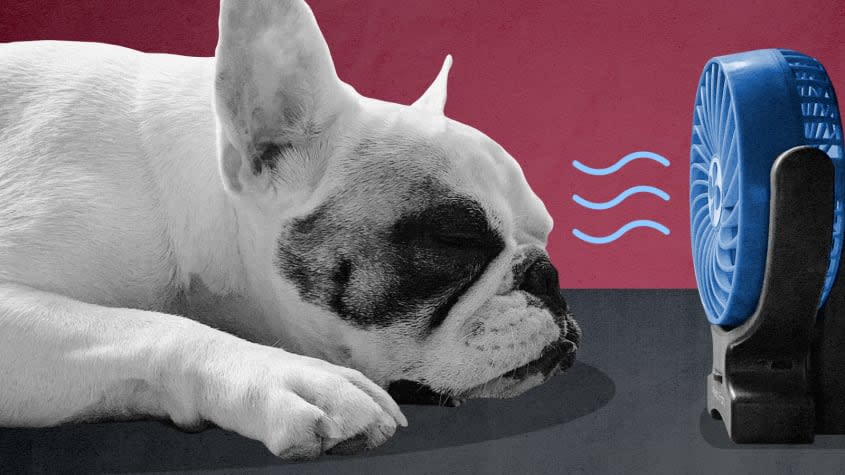What experts say about keeping your pets cool this summer

It's the start of another sweltering summer, and while you want your pet to live their best life, you also want them to stay safe. There are plenty of steps you can take to ensure your beloved dog or cat stays cool, whether it's in the pool or in the A/C. Here's everything you need to know:
How can I make my home comfortable for my pet during the summer?
To keep the sun out, close your shutters, drapes, and blinds, and turn on the air conditioner to cool things down. Experts suggest setting the A/C between 75 and 78 degrees Fahrenheit, keeping in mind that small dogs with short hair won't get as hot as big dogs with long hair. Dogs and cats know how to find the coolest place in the house, so when it's hot, look for them in dark corners or on cool tile floors.
Always make sure there is fresh water available for your pet — feel free to drop some ice cubes in there on those really warm days — and keep an eye on humidity levels. "It's important to remember that it's not just the ambient temperature, but also the humidity that can affect your pet," Dr. Barry Kellogg of the Humane Society Veterinary Medical Association said. "Animals pant to evaporate moisture from their lungs, which takes heat away from their body. If the humidity is too high, they are unable to cool themselves and their temperature will skyrocket to dangerous levels — very quickly."
What about when they are outside in the yard?
If you have a pool, make sure your dog only goes in when supervised. Some pups aren't good swimmers, and they can easily get trapped under pool covers. After their swimming sessions are over, be sure to rinse them off, so they don't have salt or chlorine left in their fur. Have fresh water available — dogs shouldn't drink pool water because of the chemicals — and remember that when the sun moves, shade can go away, so even if your dog found a nice place to curl up, they might not always have protection.
Lots of items that are found in backyards during the summer, like citronella candles and oils, are toxic for dogs, so do a sweep before letting your pets out to play. Also, if your animal must be on asphalt, put booties on them to protect their sensitive paws from the heat (it's a good idea to get walks out of the way early in the morning or after dark). If the temperatures are extreme, the safest bet is to keep your furry friends inside.
How can I keep my pets safe in the car?
Even if you have the car on and the air conditioner running, don't ever leave an animal inside a vehicle alone. When it's hot, temperatures can jump up in a parked car within minutes — the Humane Society warns that when it's 85 degrees outside, even if the windows are slightly open, the temperature can reach 102 degrees inside the vehicle in just 10 minutes. High temps can lead to irreversible organ damage or death.
If you see an animal left in a hot car, the Humane Society recommends going to nearby businesses and asking managers to make an announcement to find the owner, or calling a non-emergency police line. In many states, there are laws allowing citizens to break the windows out of a hot car in order to save an animal locked inside; check to see what the law is where you live.
What are some of the signs of overheating in pets?
Look for excessive panting, difficulty breathing, drooling, elevated heart and respiratory rate, mild weakness, and a body temperature of more than 104 degrees, the ASPCA says. Some animals are more susceptible to heat stroke, including those with flat faces, like pugs and Persian cats. Other risk factors include being a young, overweight, or elderly dog or cat. If your pet is experiencing heatstroke, immediately take them to the vet, and try to help them cool down by placing cool, wet towels on the back of their neck, paws, ear flaps, armpits, and groin area.
How can I help my scared pet when fireworks are going off?
Some dogs and cats are completely unbothered by the loud booms of fireworks, while others absolutely hate the noise, and become so startled they bolt. Even if your pets stay inside, make sure they have up-to-date identification tags and are microchipped, just in case they do go on the run, the American Veterinary Medical Association says. You'll also want to check how secure your yard is, should an unexpected firework go off while your pet is outdoors.
If you're going to a party on the Fourth, leave your pets at home — they don't have the same urge as you do to let freedom ring. They feel safe and protected in the comfort of their own home, and might do best in a crate they can't get out of; otherwise, staying in a secure room is fine. Don't leave doors or windows open that they can go through, and under no circumstances should your pet get close to a lit firecracker or sparkler.
You may also like
7 cartoons about Cassidy Hutchinson's explosive Trump testimony

